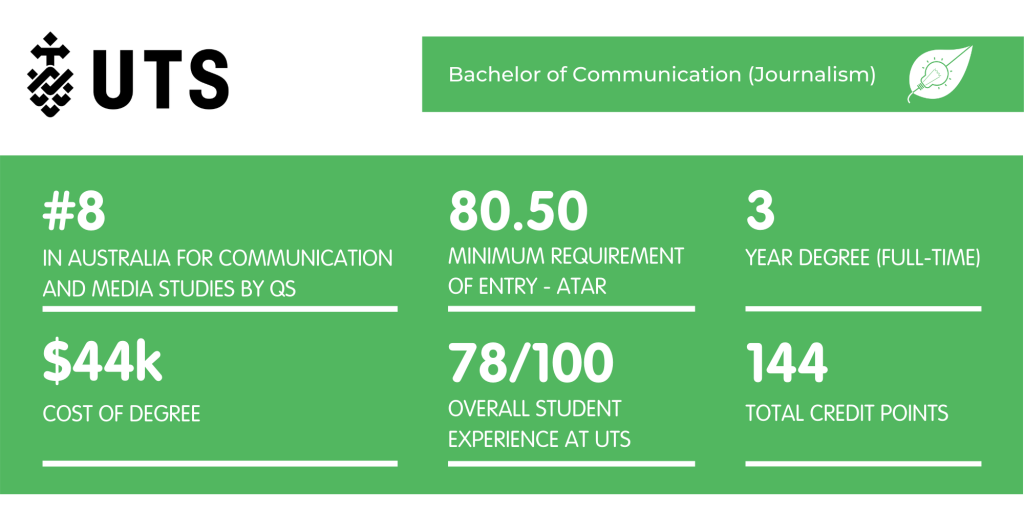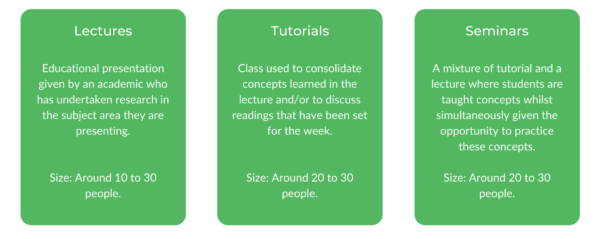Have you considered studying a Bachelor of Communication (Journalism) at UTS?
We’re here to tell you everything you need to know about this degree, including subjects, staff, culture, assessments and more!
Let’s get started!
What is a Bachelor of Communication (Journalism) at UTS?
Core Units and Majors
How to Get into a Bachelor of Communication (Journalism) at UTS
What’s the Teaching Format?
What’s the Faculty and Culture Like?
What is a Bachelor of Communication (Journalism) at UTS?
A Bachelor of Communication (Journalism) is a degree that focuses on the study of multiplatform journalism, incorporating styles such as investigative, political and environmental reporting. This degree at UTS will provide you with all that you need to pursue a journalistic, storytelling career.
UTS Journalism is an incredibly practical and fast-paced degree, designed to prepare students for a career path that is undoubtedly competitive. Although the degree can be challenging at times, assessments are fun and engaging and by the end of the degree, UTS Journalism students will have built a professional portfolio that reflects what they are most passionate about: storytelling.
Can this degree be studied in conjunction with another?
If you’re looking to expand your skillset and not limit yourself to just communications, you can combine UTS Journalism with other degrees! This just means that your time at uni will be extended, but you’ll graduate with two qualifications.
Degrees you can pair it with include Law, International Studies or Creative Intelligence and Innovation!
Career Paths
Graduating from UTS Journalism opens up opportunities to work in roles within the media industry. Career options for this degree include (but are not limited to):
-
- Reporter
- Producer
- Content editor
- Feature and freelance journalist
- Investigative journalist
- Researcher
- Media strategist
Learn more about a career as a Journalist or a Producer!
Core Units and Majors
What are the Core Units?
As with all UTS Communication degrees, there will be 3 Communication core units to complete. These are:
| Core Units | Description |
|---|---|
| Citizenship and Communication | Citizenship and Communication explores the institutions that structure our social and political world. |
| Digital Literacies | Digital Literacies helps you to grow your tech savvy skills and understanding of ethical media. |
| Communicating Difference | Communicating Difference teaches students crucial information about cultural and social difference, encouraging them to better understand diversity and how it affects all facets of life. |
The 3 Communication core subjects at UTS are designed to teach students the multiple disciplines and ethical dimensions of a career in communications.
For the Journalism major, there are 6 units that you’ll be required to study. These include:
One of the main subjects you’ll be focusing on in your final year is ‘Industry Portfolio’. This unit is a culmination of everything you’ve learnt throughout your three-year degree and you can choose to create an audio, video or written piece for your final project.
Majors aside from Journalism
You have the option to take on a second major as a UTS Journalism student, however there are eligibility requirements. This can be chosen from the following:
Though, if you aren’t eligible or just don’t want to take on another major, you can complete your course by selecting elective subjects to fill up those credit points.
Are there built-in internships?
UTS Journalism offers optional internships through electives, however when a project assessment is of a high standard, faculty members will recommend having the work published and assist in this area.
Although they are not mandatory, internships are highly recommended for this degree as they lead to a stronger chance of future employment, and help to develop networking skills vital to a journalism career.
How to Get into Journalism at UTS
The ATAR cut off for a Bachelor of Communication (Journalism) at UTS is 80.50.
Worried you do not have the marks to get into UTS Journalism? Through the UTS College program, a Diploma of Communication can be attained, guaranteeing you a place in UTS Journalism in your second year.
Are there any prerequisite subjects?
While there aren’t any prerequisite subjects for this degree, a passion for journalism and reporting is an absolute must for this course as it can be extremely challenging. UTS Journalism is very practical, with a strong focus on preparing students for a successful career in the field.
Scholarships
UTS Communication degrees offer a number of scholarships which you can find here!
What’s the Teaching Format?
UTS Journalism is delivered in semesters with a non-compulsory summer semester. Students may choose to attend classes in the summer semester to reduce their workload throughout the year and enjoy uni in the sun!
Class Structure
A Bachelor of Communication (Journalism) at UTS involves attending lectures and tutorials in the first two years, and lectures and seminars in your final year. Lectures are not compulsory and students can choose not to attend, however the tutorials and seminars are vital, providing the essential information and practical, interactive experience that a career in journalism demands.
It may sound daunting at first, but even with the combination of lectures, tutorials and/or seminars, a UTS Journalism student will usually only have three subjects a semester which means that they will only spend around 10 contact hours at uni per week!
Lectures
Lectures usually run for one hour and are almost never compulsory (meaning not many students actually attend them). Lectures are quite theoretical and exemplar based and often involve little interaction between lecturers and students.
Most of the time, only about 10 to 30 students may attend a lecture, depending on what it is about and what time it takes place. If you can be bothered getting out of bed to attend a lecture they can actually be quite informative, and you may just find a distinctive edge in your upcoming assessment!
Tutorials
Tutorials last for two hours and carry on much of the information covered in the lectures. Most tutorials involve sharing different ideas, especially regarding assessments.
Tutorials are normally made up of between 20 to 30 students and are a great way to get your thoughts out there and come up with some new and exciting ideas.
Seminars
Seminars are very similar to tutorials including how the classes are structured and how many students attend. The only difference is that they go for an extra hour longer. However, you may just need that extra hour each week in your final year to power through your final assessments and deliver career-ready results.
How much time do you spend at university?
Depending on your subjects, students will spend around 10 contact hours at university per week, with 1 hour lectures and 2-3 hour tutorials and seminars. Don’t forget that you’ll also need to factor in time to study and do your assignments!
What are the assessments like?
If you aren’t a driven student and aren’t passionate about all things journalism, then a UTS Journalism degree is probably not for you. Assessments are competitive and very practical, and involve cold-calling possible subjects and dealing with a wide variety of people.
Assessments are mostly story based, whether they be strictly news-related or more creative like a feature or multi-media pieces. We have excellent news, exams just don’t happen in a UTS Journalism degree (what a relief!), you may write an odd essay or two throughout your degree, depending on what other subjects or electives you choose, but hey, let’s focus on that no exams part!
Rest assured that the Faculty at UTS Journalism know what they are doing and are there to guide you through every assessment. Expect plenty of emails and phone calls from a dedicated Faculty, keeping you on track to achieve great results.
This degree will force you out of your comfort zone, but by the end you will be fully-prepared to go out into the field and be successful!
Skills That You Refine and Learn
| Skills | Description |
|---|---|
| Interpersonal | You will be forced to develop your interpersonal skills and learn how to interview a broad range of people (some not as pleasant as others!). Small talk will become your new language as you learn how to approach people and get the information you are looking for. |
| Critical thinking and problem-solving | Working with a range of different mediums throughout this 3 year degree, you will learn what each story requires and how to write them in order to suit the brief. |
| Practical | From the get-go, UTS Journalism students are pushed into the practical aspects of journalism. |
What’s the Faculty and Culture Like?
Faculty
Every UTS Journalism student has at least heard of the amazing Jenna Price. With a highly successful career in journalism, Jenna is a dedicated and award-winning tutor who you will definitely come across throughout this degree, and as a tutor will push you (hard) to be the best you can be!
Culture
The culture of UTS Journalism is very competitive — students will be pushed to build their portfolio through experience, internships and networking, and enhance their skills as a journalist.
Despite this, everyone is helpful and welcoming to each other, providing contacts to those who need them and assisting where they can!
Societies
The UTS Journalism Society is a popular club for UTS Journalism students to join, and will give you a leg up with assessments, networking and more! If you’re looking to connect with other students within Comms, who aren’t just studying Journalism, you can also check out the UTS Society of Communications (UTSoC).
To really get involved and have your work published, you might want to check out UTS Central News and UTS Vertigo. These are two publications by the university where you can build up your portfolio while studying!
Find out about the pros and cons of UTS Journalism in our article here!
Kellie Maloney is a driven and passionate writer who likes to flex her creative muscle on the daily. Currently, she also works as a Junior Content Writer at ClassBento, a rapidly growing startup that she is super proud to be a part of. When she is not writing for ClassBento or Art of Smart Education, Kellie can be found writing trashy poetry, cooking (barely) edible food or watching YouTube videos.






